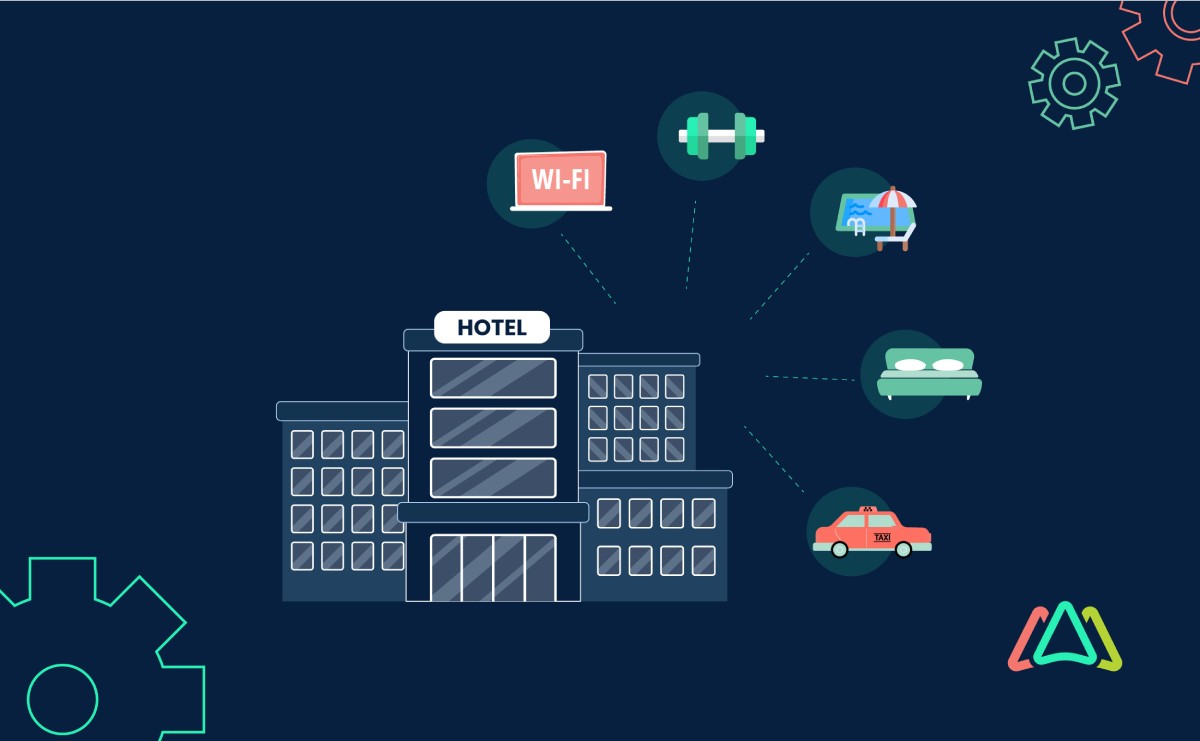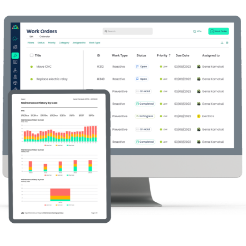
How CMMS Software Benefits Facility Managers in the Hospitality Industry
Like so many other industries, hospitality has also undergone significant changes recently. These changes have been influenced by various factors such as technological advancements, changing consumer preferences, economic trends, and global events. The most profound changes in this industry are evidenced by the application of technology integration in the forms of booking platforms, mobile apps, and websites that have made it easier for travelers to search, compare, and book accommodations. Also, hotels and restaurants use technology to enhance guest experiences, with features like keyless entry and smart room controls. Finally, and most relevant to this discussion is the use of technology in maintenance management operations. Here, we’ll begin by briefly looking at some of the challenges facing hospitality management management and then explore how Computerized Maintenance Management Software (CMMS) helps facility managers deal with these challenges.
Challenges facility managers Face in the Hospitality Industry
Maintenance management in the hospitality industry comes with its own set of challenges. Unlike manufacturing industries which produce physical products, the hospitality industry instead places priority on its ability to offer specialized service as a gateway to delivering its products to consumers. This includes hotel rooms, meals, spa facilities, entertainment, and casinos, just to name a few. To recap, the unique nature of this industry is its focus on guest experience and satisfaction.
Apart from having well-trained staff to oversee optimum customer service delivery, several challenges relate directly to effective maintenance management. Some of those are:
Managing a 24/7 Operation
Hotels, restaurants, and other hospitality establishments operate around the clock, making it challenging to schedule maintenance without disrupting guest experience. Imagine how annoying it would be if cleaning air ducts, inspecting AC units, or doing other maintenance tasks took place in a facility during high occupancy times. Finding windows of low occupancy or off-peak hours to conduct maintenance tasks can be difficult.
Seasonal Fluctuations
Many hospitality establishments experience significant fluctuations in occupancy and demand based on time of year, seasons, and special events. For instance, ski lodges see high occupancy during the winter months while water parks experience large attendance during the summer months. This poses a unique challenge when planning maintenance activities during periods of low occupancy. Conversely, facility managers are also challenged to address regular maintenance activities and attend to unexpected issues as they arise during busy times.

Guest Experience
Maintaining a positive guest experience is essential in the hospitality industry. Any disruptions caused by maintenance activities, such as noise, closed facilities, or visual disturbances, can impact guest satisfaction and lead to negative reviews.
Diverse Facilities
Hospitality establishments are known for having various facilities, each with their own challenges. These range from guest rooms, dining areas, and kitchens to pools and spas. Each facility has unique maintenance requirements, making creating a cohesive or comprehensive maintenance plan challenging.

High Standards of Cleanliness
Cleanliness and hygiene are vital in the hospitality industry. The ultimate test in these areas came during the COVID pandemic when the hospitality industry had to elevate its cleanliness and hygiene protocols. Several government agencies regulate the operations of facilities in the industry. Hotels, motels, casinos, ski lodges, resorts, and more all fall under the Occupational Health and Safety Administration (OSHA) regulations for General Industry. The challenge for maintenance activities is to comply with regulations. Beyond that, facility managers are challenged to fix problems and maintain cleanliness and order as tasks are carried out.
Emergency Response
As can be expected, maintenance issues can arise unexpectedly. These may include plumbing leaks, electrical failures, HVAC breakdowns or something more mundane as a jammed guest safe or tv malfunction. Quick and efficient emergency response is essential to minimize disruptions and ensure guest safety and satisfaction.
Cost Management
Balancing maintenance costs with the need to provide a comfortable and attractive environment for guests can be a challenge. Over-spending on maintenance can affect profitability, while under-spending can lead to deteriorating facilities and guest dissatisfaction. Finding a maintenance management solution that offers overall maintenance management cost savings and at the same time, keeps a facility in optimal operating condition is another challenge.
Sustainability
As is the case with many other industries, the hospitality industry is also increasingly focused on sustainability. This includes implementing energy-efficient systems, reducing waste, and using eco-friendly materials. Balancing sustainability goals with maintenance needs can be complex and challenging..
Preventive vs. Reactive Maintenance
Striking the right balance between preventive maintenance (scheduled upkeep to prevent breakdowns) and reactive maintenance (fixing issues as they arise) is a challenge. Over-relying on reactive maintenance can lead to frequent disruptions, while too much preventive maintenance can be costly. Finding the balance between the two is a challenge for the most efficient way to conduct maintenance management operations.
Technological Integration
The hospitality industry is adopting technology for various aspects of management, including maintenance management. Implementing and integrating computerized maintenance management systems (CMMS), Internet of Things (IoT) devices, and other tech solutions can be complex but necessary for efficient maintenance operations in many facilities. Finding the right maintenance management software that has these capabilities and can offer the resources to assist in its installation is often a challenge for facilities with specific needs.
Overcoming these challenges requires a proactive and strategic approach to maintenance management, with a strong focus on guest satisfaction, operational efficiency, and maintaining the overall guest experience.

How CMMS Assists in Maintenance Management in the Hospitality Industry
CMMS software with its robust capabilities and user friendly interface provides significant benefits to facility managers in the hospitality industry. The software does this by streamlining and enhancing all facility maintenance operations. The hospitality industry, which includes hotels, resorts, restaurants, and other lodging establishments, requires efficient management of facilities to provide a pleasant and comfortable experience for guests. Here's how a facility management software can help facility managers:
1. Streamlined Maintenance Processes
CMMS software helps facility managers organize and schedule maintenance tasks more effectively. It allows them to create and assign work orders, track progress, and monitor completion status. The software has the capability to streamline the maintenance process and ensures that all necessary tasks are carried out promptly and efficiently. Since there is great diversity in hospitality facilities, CMMSs also can be customized to meet unique needs.
2. Preventive Maintenance
Preventive maintenance is crucial in the hospitality industry to minimize disruptions and ensure guest satisfaction. CMMS software enables facility managers to set up recurring maintenance tasks, inspections, and checks. This helps identify and address potential issues before they turn into major problems, reducing downtime and costly emergency repairs. Preventative maintenance schedules can be altered during high and low occupancy or user seasons.
3. Asset Tracking
Hospitality facilities have a wide range of assets that require regular maintenance. These include, HVAC systems, elevators, plumbing, electrical systems, and more. CMMS software enables facility managers to keep detailed records of each asset, including its maintenance history, warranty information, and service schedules. This information helps when making informed decisions about repairs, replacements, and upgrades.
4. Inventory Management
Proper inventory management is essential when it comes to maintaining supplies and spare parts that are needed for maintenance and repairs. CMMS software helps facility managers to keep track of inventory levels, reorder supplies when needed, and avoid overstocking or shortages. This helps in reducing costs and ensuring that maintenance tasks are not delayed due to lack of necessary materials.
5. Resource Allocation
CMMS software helps facility managers allocate resources effectively by providing insights into labor requirements, equipment availability, inventory cost, and task priorities. This optimization ensures that the right people are sent to do a task they are trained to do and with the equipment or spare part that is needed to carry out the task. The end result is an improvement in overall efficiency.
6. Compliance and Reporting
As noted previously, the hospitality industry is required to adhere to various regulatory standards and health codes. One of the benefits of CMMS software is its ability to generate reports and documentation required for compliance audits, ensuring that the facility meets health, safety and regulatory standards.
7. Communication and Collaboration
CMMS software facilitates communication and collaboration among maintenance teams, departments, and external contractors. Facility managers can communicate task details, share updates, and provide instructions within the software platform, reducing miscommunication and enhancing teamwork. The work order app makes these tasks even more seamless since they can occur remotely with real time access and response time.
8. Data-Driven Insights
CMMS software collects and stores data related to maintenance activities, asset performance, downtime, and costs. The software offers facility managers the ability to analyze this data to identify trends, pinpoint areas of improvement, and make informed decisions to optimize maintenance operations. The information from these insights can direct operational decision making.
9. Cost Control
By implementing preventive maintenance and efficient resource allocation in a timely manner, CMMS software helps control overall maintenance costs. It reduces the likelihood of costly breakdowns, helps with asset lifecycle management, and enables better budget planning.
10. Guest Satisfaction
Efficient maintenance operations directly contribute to increased guest satisfaction. Well-maintained facilities lead to a more comfortable and enjoyable experience for guests, resulting in positive reviews and repeat business. Given guests’ heavy reliance on booking apps, achieving a five star rating is more likely with a properly implemented CMMS system.
Check out our list of operational, financial, customer satisfaction, risk management, and other facility management KPIs and learn how to select the right ones for your business.
Conclusion
The hospitality industry has undergone significant change during the last two decades. One of those changes is its adoption of technology in a number of ways including when it comes to facility maintenance management operations. In the hospitality industry, where guest experience is paramount, CMMS software plays a crucial role in ensuring that facilities are well-maintained, operations run smoothly, and guests are provided with a high-quality stay. The remaining challenge for facility owners and facility managers is to spend the time carefully researching a CMMS solution that best meets its needs and budget.
TABLE OF CONTENTS
Keep Reading
Ever find yourself checking into a luxury hotel and expecting a relaxing stay, only to find a ...
11 Apr 2025
Organizations are witnessing swift changes in the business environment and confronting a ...
8 Apr 2025
Last month, news outlets and the entire internet was abuzz with the return of NASA astronauts ...
3 Apr 2025
What comes first - CMMS or predictive maintenance? If your answer is either, it is correct. ...
28 Mar 2025
Artificial intelligence (AI) talk has become commonplace. Today, engaging in business-focused ...
27 Mar 2025
Imagine a world where machines predict, diagnose, and fix their issues before they fail. This ...
25 Mar 2025
A facility maintenance plan is at the core of a facility’s operations. This organized ...
21 Mar 2025
Think of managing your maintenance operations like managing a championship sports team. Just ...
21 Mar 2025
The maintenance sector is battling a severe talent shortage that threatens to undermine ...
7 Mar 2025
Manufacturing maintenance is the backbone of industrial efficiency, ensuring machines run ...
5 Mar 2025
No one likes playing a guessing game when equipment breaks down. Yet, maintenance teams often ...
4 Mar 2025
The size of the preventive maintenance software market is discussed in millions of dollars, ...
4 Mar 2025
The organizational structure and corporate hierarchy vary from company to company. Large ...
28 Feb 2025
Maintenance procedures are essential for ensuring the longevity and reliability of machinery ...
21 Feb 2025
Sustainability is no longer just a buzzword; it's a critical component of corporate social ...
20 Feb 2025
A Computerized Maintenance Management System (CMMS) relies on accurate, well-organized data ...
18 Feb 2025
In an era where technology drives operational efficiency, Computerized Maintenance Management ...
14 Feb 2025
A Computerized Maintenance Management System (CMMS) is a key component of modern maintenance ...
13 Feb 2025
Introduction Maintenance management is the foundation of maintenance operations in industries ...
11 Feb 2025
Introduction A Computerized Maintenance Management System (CMMS) is software designed to help ...
7 Feb 2025





